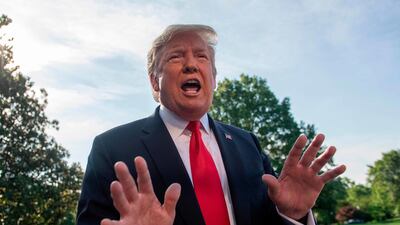US President Donald Trump insisted on June 2 that he never called Meghan, Duchess of Sussex, "nasty."
Trump allegedly used the adjective while discussing Meghan in a recent interview with Britain's The Sun newspaper in the run-up to his state visit to the UK on June 3. But debate on social media since then has raged over whether his use of "nasty" referred to the duchess herself or the negative things she said about him in 2016. Trump and his defenders have accused the news media of spreading a deliberately false narrative.
"I made no bad comment," Trump told reporters as he left the White House for London. He also took to Twitter.
In response, an audio clipping of the interview was posted on the newspaper's website, where Trump discusses the upcoming state visit, his second meeting with Queen Elizabeth II and the Trump family members who are going along on the trip. The reporter then asks about Meghan, who isn't joining other royals to meet Trump and his wife, Melania, due to the recent birth of her first child, Archie.
Asked if he was sorry to miss out on meeting the American-born Meghan and told that she "wasn't so nice about you" during the campaign, Trump says: "I didn't know that. No, I hope she's OK. I did not know that." When told that Meghan once said she might move to Canada if Trump was elected, Trump responds: "There are a lot of people moving here, so what can I say? No, I didn't know that she was nasty."
Meghan supported Hillary Clinton, the Democratic presidential candidate in 2016, calling Trump "divisive" and "misogynistic."
After the interview was released, reporters at some news organisations tweeted that Trump called Meghan "nasty", sparking debate. The case isn't as clear as Trump portrays it to be, said Kathleen Hall Jamieson, director of the University of Pennsylvania's Annenberg Public Policy Center.
Jamieson told Associated Press in an email that since Trump's interviewer is informing him about a statement that Trump says he was unaware of, "one would ordinarily assume that his answer refers to that statement". But she says the answer - "was nasty" - could refer to a person or to what the person said. Complicating matters, Jamieson added, is Trump's history of verbal attacks on people he views as antagonists and his sensitivity to negative statements about his election.
"As a result, difficult to know what he meant," she said.
In the same interview, Trump also spoke positively about Meghan when asked whether it was good for an American to be a member of the British royal family. "I think it's nice. I'm sure she will do excellently," Trump said. "She'll be very good. She'll be very good. I hope she does."

